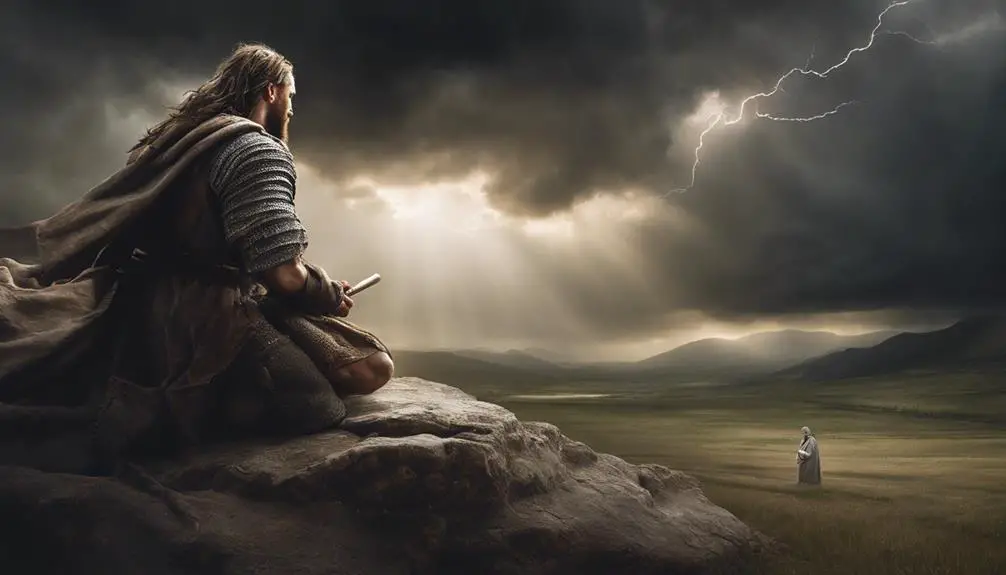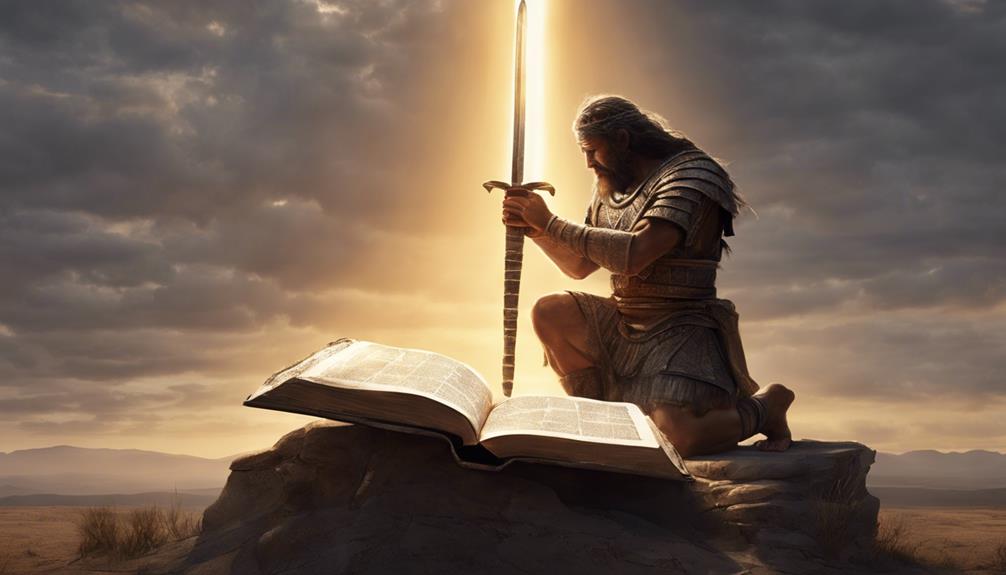Marvel at the power of prayer in biblical warfare, revealing a transformative approach to life's battles rooted in profound faith and divine connection.

Warriors Prayer in the Bible
Have you ever considered the theory that warriors in the Bible utilized prayer as their ultimate weapon?
This intriguing concept draws from numerous Biblical narratives, where prayers were often integral to victories. Yet, it's not the mere act of prayer that's noteworthy, but the profound faith and divine connection it reveals.
As we unpack this further, you'll discover a whole new perspective on spiritual warfare, which might just transform your own approach to life's battles. Intrigued yet?
Key Takeaways
- Prayer played a critical role in biblical battles, serving as both a defensive and offensive tool in the hands of warriors.
- Notable warriors like David, Joshua, and Gideon exemplified unwavering faith through their battle prayers.
- Interpreting these biblical warrior prayers can provide insights into spiritual warfare and the fight for righteousness.
- Modern combat prayers, rooted in biblical teachings, offer a framework for strength, resilience, and faith in challenging situations.
Understanding Biblical Warriors

To fully grasp the concept of warriors in the Bible, you need to delve into the historical and cultural contexts that shaped these formidable figures. The Warrior Ethos in the Bible isn't merely about physical strength but encompasses broader qualities such as courage, faith, and obedience to God's commands.
For instance, biblical figures like David, Gideon, and Joshua weren't just renowned for their martial prowess, but also for their unwavering commitment to God's directives. Their actions were guided by their deep-seated belief in God and adherence to His commands, demonstrating the essence of the Warrior Ethos in the Bible.
Biblical Battle Strategies, on the other hand, often highlighted divine intervention and the importance of spiritual preparation. Battles weren't won merely by superior number or weaponry; instead, success was attributed to God's favor and providence. Strategies included adherence to God's instructions, maintaining moral and spiritual purity, and the use of psychological warfare.
In essence, Biblical warriors and their battle strategies provide a fascinating lens through which to understand the convergence of faith, warfare, and culture in ancient times. This lays the groundwork for our discussion of the 'Warrior's Prayer in the Bible' in the subsequent subtopics.
The Significance of Prayer in Battle

In the heat of battle, prayer emerges as a critical spiritual weapon for biblical warriors, with its significance often overlooked in conventional discussions of warfare. You see, prayer isn't just a silent plea, but rather a vital component of battlefield devotion, forming the spiritual armament of the warriors.
Just as physical weapons are wielded, prayers are launched into the spiritual realm, serving as defensive and offensive tools. These prayers, loaded with faith and trust in divine intervention, help to create a spiritual fortress, providing protection and guidance amidst the chaos of battle.
Moreover, prayer in battle signifies an acknowledgement of one's dependence on a higher power. It's not mere ritualistic recitation, but an expression of vulnerability and trust in divine prowess. It's a warrior's intimate dialogue with God, seeking strength, courage, and wisdom for the fight.
In addition, this battlefield devotion underscores the transformative power of prayer. It's not just about seeking victory, but also about spiritual growth and character formation. In the crucible of conflict, prayer helps warriors not only to fight but also to evolve, underlining the deep, multi-faceted significance of prayer in battle.
Notable Biblical Warrior Prayers

Delving into the scriptures, you'll find a plethora of warrior prayers that offer a revealing glimpse into the profound faith and relentless spirit of biblical warriors. These prayers manifest the true essence of a warrior's faith and the biblical courage that underpinned their actions.
Take, for instance, the prayer of Joshua in the Battle of Jericho, a classic representation of a warrior's call for divine intervention. His prayer wasn't merely an appeal for victory, but a testament to his unwavering faith and courage in the face of adversity.
Another notable example is David's prayer before his confrontation with Goliath. Despite facing a seemingly insurmountable enemy, David's prayer epitomized the essence of biblical courage – an unshakable belief in God's deliverance irrespective of the odds.
Lastly, consider the prayer of Gideon before his battle against the Midianites. This prayer epitomizes the warrior's faith, showcasing a deep reliance on divine guidance and strength.
These examples provide a window into the spiritual fortitude of biblical warriors. Their prayers weren't mere words, but heartfelt expressions of faith and courage that resonated in the heart of God, defining their identity as warriors.
Interpreting Warriors' Prayers

Understanding these warrior prayers requires a keen eye and an open heart, ready to dissect the underlying messages and interpret their significance in the context of biblical narratives. The warrior symbolism woven throughout these prayers isn't merely about physical battles; it embodies spiritual warfare, the struggle against inner demons, and the fight for righteousness.
To comprehend the depth of these prayers, it's crucial to unravel the complex layers of warrior symbolism. It's about courage, resilience, and the constant battle within oneself to uphold morality, faith, and truth. The warriors in the Bible aren't just soldiers; they're spiritual warriors, striving against evil forces.
The power of prayer is another evident theme. Prayer power, in these contexts, doesn't merely refer to the act of praying, but to the influence, transformation, and strength it bestows upon the one who prays. It's a weapon for spiritual warriors, a shield against temptation, a guide in the wilderness of life's trials.
Interpreting warriors' prayers, therefore, involves understanding the intricate dance between warrior symbolism and prayer power, and how these elements intertwine to deliver a deeper, spiritual message. You mustn't take them at face value, but delve deeper, exploring the rich symbolism and power they convey.
Application of Warrior Prayers Today

Today's world, with all its complexities and challenges, can benefit significantly from the application of warrior prayers. These prayers, often rooted in biblical teachings, provide a framework for strength, resilience, and faith in the face of modern adversities.
Modern Combat Prayers |
Relevance |
Role of Faith |
|---|---|---|
Armor of God Prayer |
This prayer calls for divine protection, making it applicable in conflicts, personal trials, and societal issues. |
Faith is the backbone of this prayer. It reinforces the belief in divine intervention and protection. |
Psalm 91 |
Often used in times of danger, it's relevant in today's world filled with uncertainties. |
The role of faith here is to instill confidence in divine safety, irrespective of the threat one faces. |
Prayer of Jabez |
This prayer for blessing and enlargement is applicable in personal growth and life's pursuits. |
Faith in this context is trusting in God's ability to bless, protect, and expand one's territory. |
Frequently Asked Questions
What Societal or Cultural Factors Influenced the Concept of Warriors in the Bible?"
In understanding the societal and cultural factors that influenced Biblical warrior symbolism, you'd look at the societal structure and values of ancient Israel. They were often at war, so warriors were revered.
Additionally, the Bible's interpretation often reflects the mindset of a culture in conflict. Understanding this context enriches your grasp of the warrior imagery within the Bible, outside of a specific warrior's prayer.
Can the Warrior Prayers From the Bible Be Used in a Non-Combat Context?"
Absolutely, you can use warrior prayers in non-combat contexts. They're not just about physical battles. You're battling daily challenges, personal struggles or societal issues, right? These prayers could be your go-to.
Their relevance lies in the strength and courage they inspire. Just reinterpret them in a modern context. It's about finding personal meaning and applying that to your life.
What Is the Historical Context of the Battles Mentioned in the Bible Where Warrior Prayers Were Used?"
You're asking about the historical setting of biblical battles where warrior prayers were used. These instances often showcase battlefield spirituality, with soldiers seeking divine intervention.
Battles, like those of David and Goliath, or Joshua at Jericho, display this vividly. These aren't just physical conflicts, but spiritual ones, where faith is as much a weapon as any sword.
These prayers reveal a deep belief in divine providence and intervention in the midst of conflict.
Are There Any Similar Concepts of Warrior Prayers in Other Religious Texts?"
Yes, there are similar concepts to warrior prayers in other religious texts.
In Comparative Religion Analysis, you'll find prayers or chants for protection, strength and victory in battle. For instance, Hindu scriptures have the Kavach mantras.
Interfaith Dialogue Implications suggest that, while specifics differ, many faiths use prayer as a tool for empowerment in challenging circumstances. It's a universal theme, reflecting humanity's need for spiritual support in times of conflict.
Does the Concept of Warrior Prayers Conflict With the Biblical Teachings of Peace and Love?"
You might think warrior prayer interpretations conflict with the biblical teachings of peace and love. However, it's not about promoting violence, but spiritual warfare against evil.
Pacifism in scripture doesn't mean avoiding all conflict, but seeking peaceful resolutions when possible. Warrior prayers embody this, asking for courage and strength in the fight against spiritual darkness.
Therefore, they don't contradict, but complement the teachings of peace and love.
Conclusion
In closing, understanding warriors' prayers in the Bible is key to appreciating their faith and reliance on divine intervention during battles. These prayers, full of desperation and hope, aren't only historical records, but also relevant tools for spiritual warfare today.
By interpreting and applying these prayers, you can deepen your faith and fortify your spiritual resilience. Remember, as a modern-day warrior, your battles may be different, but your source of strength remains the same.



Sign up